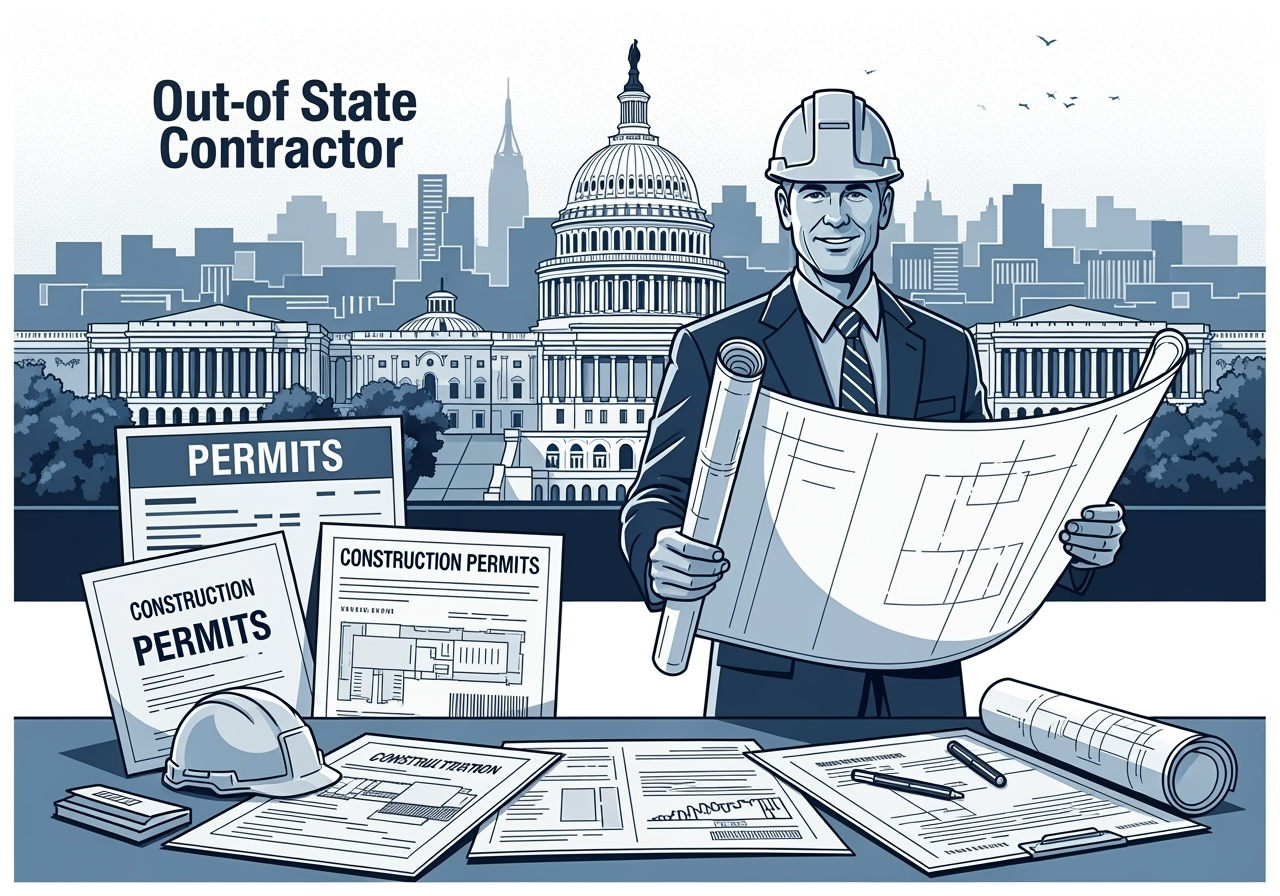Out-of-State Contractors: Navigating DC Permit Requirements
Essential guide for out-of-state contractors working in Washington, DC. Learn permit requirements, licensing needs, and compliance strategies to avoid costly delays and violations.
Working in Washington D.C. as an out-of-state contractor presents unique challenges that can quickly turn profitable projects into costly headaches. The District's complex regulatory environment, strict licensing requirements, and intricate permit processes often catch experienced contractors off-guard, leading to project delays, fines, and frustrated clients.
If you're an out-of-state contractor considering DC work or already committed to a project, this comprehensive guide will help you navigate the regulatory maze successfully.
The Reality of DC's Regulatory Environment
Washington D.C. operates under some of the most stringent construction regulations in the nation. Unlike many jurisdictions that may accept out-of-state licenses with minimal requirements, DC maintains strict local compliance standards that apply to all contractors, regardless of their home state credentials.
Key Challenge: Many contractors assume their home state experience translates directly to DC work. This assumption often leads to expensive mistakes and project delays.
Essential Licensing Requirements for Out-of-State Contractors
Basic Contractor License
All contractors performing work valued over $200 must obtain a DC contractor license through the Department of Consumer and Regulatory Affairs (DCRA). This applies even if you hold licenses in Virginia, Maryland, or other nearby states.
Application Requirements:
Proof of general liability insurance ($300,000 minimum)
Workers' compensation insurance documentation
Financial responsibility verification
Passing score on DC contractor examination
Background check clearance
Trade-Specific Licenses
Specialized work requires additional licensing:
Electrical Work:
DC electrical contractor license
Master electrician designation
Separate permits for each electrical project
Plumbing Work:
DC plumbing contractor license
Master plumber certification
Individual project permits required
HVAC Work:
DC mechanical contractor license
EPA certifications
Refrigerant handling permits
Timeline Considerations
Licensing processing typically takes 4-8 weeks, assuming all documentation is complete and accurate. Plan accordingly, as work cannot legally begin without proper licensing.
Permit Application Challenges for Out-of-State Contractors
Documentation Requirements
DC permit applications require extensive documentation that often differs from other jurisdictions:
Architectural Plans:
Must be sealed by a DC-licensed architect or engineer
Detailed structural calculations required
Energy code compliance documentation
Accessibility compliance verification
Insurance Documentation:
Certificate of insurance naming the District as additional insured
Minimum coverage amounts that may exceed your current policy
Workers' compensation coverage meeting DC requirements
Common Application Mistakes
1. Inadequate Plan Details Many out-of-state contractors submit plans that meet their home state requirements but fall short of DC standards. This results in immediate rejections and resubmission delays.
2. Insurance Coverage Gaps DC requires specific insurance language and coverage amounts. Standard policies from other states often need endorsements or increases.
3. Missing Local Requirements DC has unique requirements like public space permits for sidewalk work, traffic control plans for street-adjacent projects, and environmental assessments for certain renovations.
Working with DC Regulatory Agencies
Department of Buildings (DOB)
Formerly DCRA, DOB handles most construction permits and inspections. Key considerations:
Inspection Scheduling:
Longer lead times than many jurisdictions
Strict adherence to approved plans required
Re-inspection fees for failed inspections
Plan Review Process:
Initial review: 30 days (often longer in practice)
Revision cycles can extend timeline significantly
Direct communication with plan reviewers limited
Department of Transportation (DDOT)
Required for projects affecting public space:
Public Space Permits:
Sidewalk work
Curb cuts and modifications
Temporary construction staging
Traffic control during construction
Timeline Impact: DDOT permits often take 6-12 weeks and must be obtained before DOB permits in many cases.
Cost Considerations for Out-of-State Contractors
Direct Costs
Licensing Fees:
Contractor license: $300-$500
Trade licenses: $200-$400 each
Examination fees: $100-$200 per test
Permit Fees:
Generally higher than surrounding jurisdictions
Complex fee structures based on project value and scope
Additional fees for expedited processing
Hidden Costs
Extended Timeline Costs:
Longer permit processing times
Multiple revision cycles
Extended project schedules
Compliance Costs:
Local insurance requirements
Additional documentation
Potential legal consultation needs
Mistake Costs:
Stop work order resolution
Violation fines
Re-work due to code misunderstandings
Strategies for Success
Pre-Project Planning
1. Regulatory Research Invest time understanding DC-specific requirements before bidding. What works in your home state may not apply in DC.
2. Local Partnership Consider partnering with established DC contractors for your first few projects. Their local knowledge can prevent costly mistakes.
3. Professional Consultation Engage local permit expediting services or consultants familiar with DC processes. The cost is often offset by time savings and mistake avoidance.
During Project Execution
1. Maintain Detailed Records DC inspectors are thorough and expect comprehensive documentation of all work performed.
2. Proactive Communication Establish relationships with inspectors and plan reviewers. Professional, respectful communication can expedite problem resolution.
3. Compliance Monitoring Regularly verify work against approved plans. Deviations require formal approval before proceeding.
Red Flags That Trigger Scrutiny
Inspection Triggers
Certain situations automatically increase regulatory attention:
Previous Violations: Any history of permit violations in DC or other jurisdictions
Complex Projects: Structural modifications, historic properties, or multi-unit buildings
Complaint-Driven Inspections: Neighbor complaints often trigger unscheduled inspections
Avoiding Problems
1. Permit Before Work Never begin work without proper permits, even for seemingly minor tasks
2. Licensed Worker Requirements Ensure all workers performing licensed trades hold appropriate DC credentials
3. Insurance Compliance Maintain current insurance certificates and notify carriers of DC work requirements
When Things Go Wrong
Stop Work Orders
If you receive a stop work order:
Immediate Actions:
Stop all work immediately
Document the violation notice
Contact DOB within 24 hours
Develop correction plan
Resolution Process:
Address all cited violations
Submit corrective documentation
Schedule re-inspection
Obtain written clearance before resuming work
Violation Penalties
DC imposes significant penalties for permit violations:
Fine Structure:
Initial violations: $500-$2,000
Repeat violations: $2,000-$10,000
Daily accumulating fines possible
The Value of Professional Help
When to Engage Experts
Consider professional permit assistance when:
Project Complexity:
Multiple permit types required
Historic property involvement
Structural modifications planned
Timeline Pressure:
Tight project schedules
Client deadline requirements
Seasonal construction windows
Risk Mitigation:
High-value projects
Reputation-sensitive clients
First-time DC work
Cost-Benefit Analysis
Professional permit services typically cost 1-3% of project value but can save:
Time Savings:
Faster permit approval
Reduced revision cycles
Streamlined inspection process
Cost Avoidance:
Violation penalties
Stop work order resolution
Extended project timelines
Building Long-Term Success in DC
Relationship Development
Successful out-of-state contractors invest in:
Local Networks:
Professional associations
Contractor groups
Industry relationships
Regulatory Relationships:
Respectful inspector interactions
Consistent compliance history
Professional reputation building
Continuous Learning
DC regulations evolve constantly. Successful contractors:
Stay Informed:
Subscribe to regulatory updates
Attend industry seminars
Maintain professional development
Adapt Processes:
Update procedures based on experience
Incorporate lessons learned
Refine documentation practices
Conclusion
Working as an out-of-state contractor in Washington D.C. requires careful preparation, thorough understanding of local requirements, and often professional guidance. While the regulatory environment is complex, contractors who invest in proper preparation and compliance can build successful, profitable businesses in the District.
The key to success lies in respecting DC's unique requirements, planning for extended timelines, and seeking expert guidance when needed. The upfront investment in proper licensing, documentation, and professional support typically pays dividends through smoother project execution and reduced compliance risks.
Remember: DC's construction market offers significant opportunities, but only for contractors who approach it with the preparation and respect it demands.
Need help navigating DC permit requirements as an out-of-state contractor? Contact M.C.G. Permit Consultants at (202) 729-8272 for expert guidance and support. With 25+ years of DC experience, we help contractors avoid costly mistakes and streamline their permit processes.

